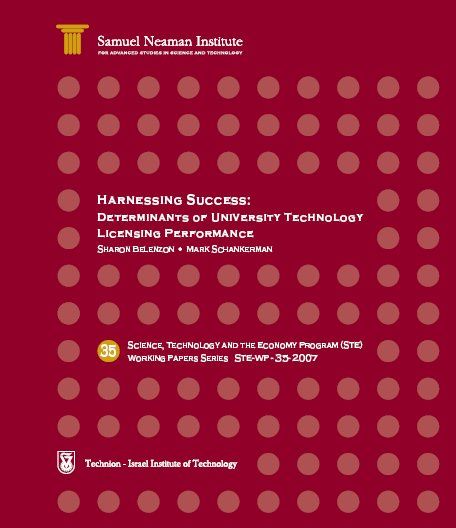Establishment of R&D Anti-Terror Warfare Mechanism for Homeland Security Protection from Terrorism

The number of dangers on the Israel Home Front is extremely high. We can never avert every possible terror threat, yet, while different types of threats disappear, new threats are popping up and terrorists keep changing their methods and systems relentlessly in order to achieve their goals. Therefore, the State of Israel must have a […]
Data and Indicators on Aerospace Engineering, ICT and Biotechnology in Israel
The current report presents data and indicators of three fields of knowledge: Aerospace Engineering, ICT (Information and Communications Technologies), and Biotechnology. The Israeli Aerospace engineering review covers the space plans achievements, the main space institutes, the Aerospace engineering faculty at the Technion, bibliometric data, and military, economy and social aspects of the Israeli space plan. […]
The Ramifications of Technology Transfer Based on Intellectual Property Licensing

The commercialization of scientific inventions by academic institutions was the subject of reform initiatives in recent years. Regulatory initiatives proposed to encourage public research institutions (sometimes even to impose a legal duty), to exploit the commercial potential of their inventions via intellectual property. Recent studies on the impact of the Bayh-Dole Act on scientific research […]
Environmental technologies – the green future

The field of environmental technology development includes a very wide range of activities. In the study, which is conducted jointly by the Samuel Neaman Institute, Globes Research and Kesselman & Kesselman, we show that there are very large opportunities in the new market and that the government must take a series of actions realize these […]
Harnessing Success: Determinants of University Technology Licensing Performance STE-WP-35

We study the impact of incentive pay, local development objectives and government constraints on university licensing performance. We develop and test a simple contracting model technology licensing offices, using new survey information combined with panel data on 86 U.S. universities for the period 1995-99. We find that private universities are much more likely to adopt […]
KNOWLEDGE-INTENSIVE PROPERTY RIGHTS (STE-WP-39)
Venture capitalism is a major institutional innovation based on identifying economies of scope in transactions of technological knowledge, bundled with managerial competence, reputation, screening procedures and equity. It has paved the way to the emergence of new surrogate markets for knowledge, i.e. financial markets specialized in trading knowledge-intensive property rights. This development has important benefits […]
The Limits of Capital: Transcending the Public Financer – Private Producer Split in R&D (STE-WP-40)
Despite a strong tendency in the privatization literature to prefer private sector solutions to public sector ones, in the case of R&D a near consensus has emerged that supports public R&D funding for private production as a solution to a host of market failures. This article explores theoretical justifications for a more expansive role for […]
Investment Policies in Defense R&D Programs
Investment in advanced defense technologies is a prominent characteristic of modern armed forces. The paper examines the optimal investment policy in developing such technologies, accounting for their S-shaped progress profile and the stochastic nature of the R&D process. We show that the optimal investment is a discontinuous function of the available budget, and that its […]
Innovation Policy for Development: an Overview STE-WP-34
This paper provides a framework for thinking about innovation policies for development. In such context innovation should be construed as a very broad notion that includes product and in process innovations of various sorts, generated by rank and file workers as much as by R&D labs. The economic rationale for government support of R&D needs […]
